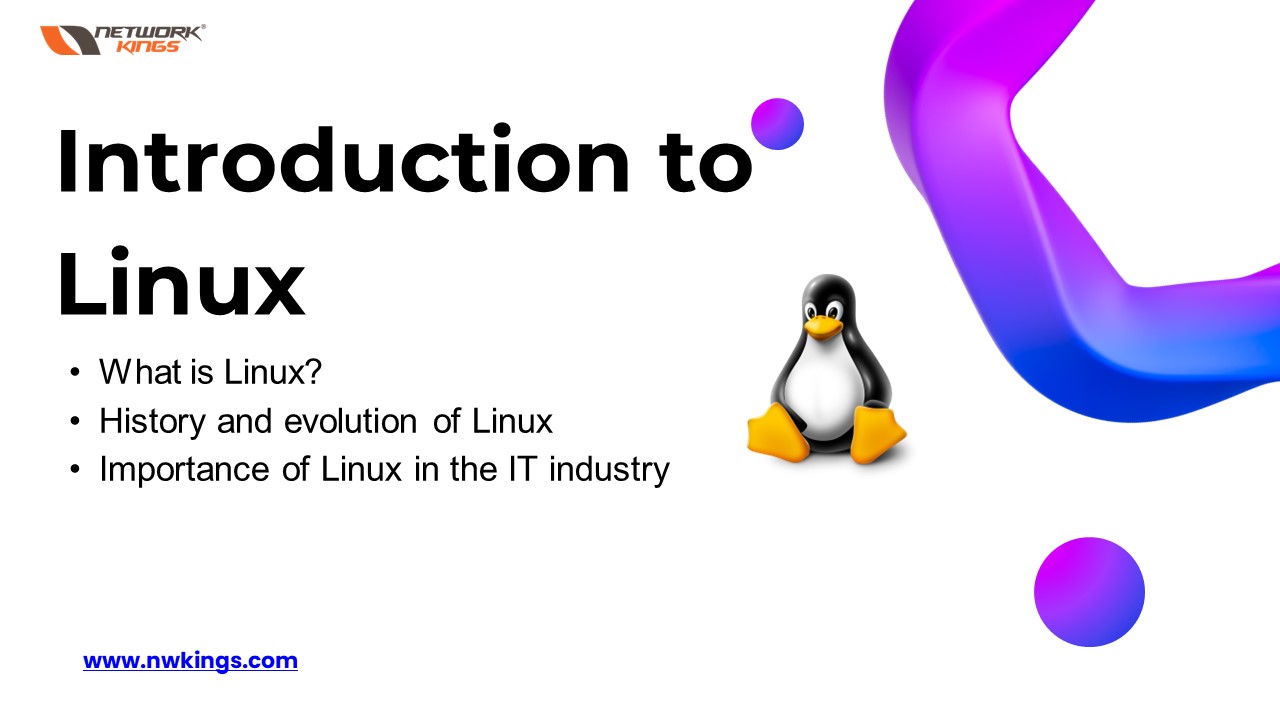Best Linux Online Training - PowerPoint PPT Presentation
Title:
Best Linux Online Training
Description:
Looking for the fine Linux Online training? Network Kings offers professional online courses for Linux Online Certification. Get hands-on training and learn crucial capabilities in network protection, machine hacking, and greater. Enroll now Network kings and open doors to a better profession with international recognition. – PowerPoint PPT presentation
Number of Views:3
Title: Best Linux Online Training
1
Introduction to Linux
- What is Linux?
- History and evolution of Linux
- Importance of Linux in the IT industry
www.nwkings.com
2
What is Linux?
Linux is an open-source operating system kernel
that powers a wide range of devices, from servers
to smartphones. It provides a foundation for
various Linux distributions, offering stability,
security, and flexibility for users and
developers.
www.nwkings.com
3
History and evolution of Linux
Linux was created by Linus Torvalds in 1991. It's
a free, open-source operating system kernel based
on Unix. Over the years, it has evolved into
various distributions, such as Ubuntu and Fedora,
and is widely used for servers, mobile devices,
and embedded systems.
www.nwkings.com
4
Importance of Linux in the IT industry
Linux is crucial in the IT industry for its
stability, security, and open-source nature. It
powers servers, supercomputers, and embedded
systems, offering flexibility and
cost-effectiveness. Its community-driven
development fosters innovation and customization,
making it a cornerstone of modern computing.
www.nwkings.com
5
Linux Installation
Different methods of installing Linux
Virtualization and dual-boot setups
There are three main methods to install Linux
Live CD/USB installation, Network installation,
and Dual-boot installation alongside another
operating system. Each method has its own
advantages and is suitable for different
situations.
Virtualization allows running multiple operating
systems concurrently on a single physical
machine, providing flexibility and isolation.
Dual-boot setup enables choosing between two
operating systems on startup, ideal for
maintaining separate work and personal
environments.
www.nwkings.com
6
Linux Shell Scripting
Linux shell scripting involves writing scripts to
automate tasks, perform system administration,
and manage processes. It uses the Bash shell and
various commands to create powerful and efficient
scripts for Linux systems.
www.nwkings.com
7
Linux Networking
Linux networking involves configuring network
interfaces, setting up IP addresses, managing
network services, and troubleshooting
connectivity issues. Common tools like ifconfig,
ip, and netstat are used to manage networking in
Linux systems.
www.nwkings.com
8
Linux Security
Linux security involves implementing best
practices such as regular updates, using strong
passwords, configuring firewalls, and monitoring
system logs. Additional measures include using
encryption, access controls, and intrusion
detection systems to protect against potential
threats and vulnerabilities.
www.nwkings.com
9
Advanced Linux Topics
Here's a brief overview of advanced Linux topics
Linux kernel customization, system performance
tuning, network configuration, shell scripting,
security hardening, package management,
virtualization, and containerization. These
topics delve into advanced system administration
and management.
www.nwkings.com
10
Thank you
www.nwkings.com































